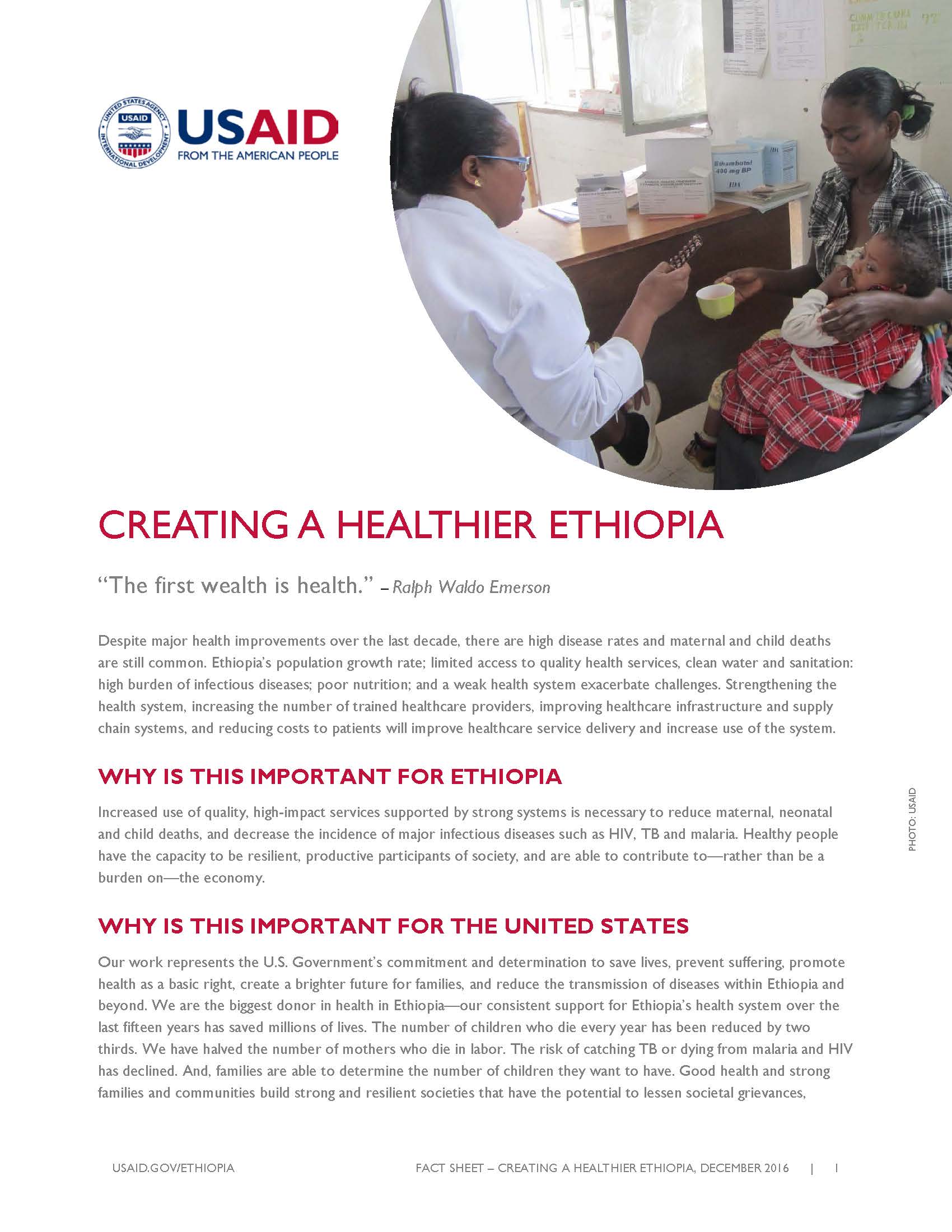Ethiopia
- History
- Our Work
- Foreign Assistance Data
- Dollars to Results
- PARTNERS
- Newsroom
- Fact Sheets
- WORK WITH US
Since the HIV/AIDS epidemic arrived in Ethiopia, attitudes toward the disease as well as the opportunities for treatment and a healthy life have changed dramatically. With the Government of Ethiopia's commitment to providing national free treatment for HIV/AIDS, patients have increased access to HIV services in their local communities.
Through the President's Emergency Plan for Aids Relief, USAID has been working to support the delivery of life-saving HIV/AIDS treatment in Ethiopia. From strengthening pharmaceutical supply chains to supporting rural health workers to providing technical assistance to policymakers, U.S. assistance is making a real difference in the lives of Ethiopians.
In just one year, the number of Ethiopians accessing HIV counseling and testing, increased from 500,000 to more than nine million. The number of people on anti-retroviral therapy increased from 900 in 2005 to 394,000 in 2015.
Despite major strides in improving the health of the population over the last decade, the Ethiopian people still face high rates of death and disease. Ethiopia has the second largest population of any country in sub-Saharan Africa—estimated at approximately 104 million. Forty five percent are under the age of 15 and 80 percent live in rural areas. About 350,000 children die each year and more than 90 percent of these deaths are due to preventable or treatable causes such as pneumonia, diarrhea, malaria, malnutrition and HIV/AIDS. Ninety percent of births occur without the assistance of a skilled health professional, and as a result, approximately 19,000 new mothers die each year.
High fertility and lack of access to quality services result in 420 pregnancy-related maternal deaths for every 100,000 live births—one of the world’s highest rates. Chronic malnutrition also remains a persistent underlying cause of child mortality, with 44 percent of children under five years of age suffering from childhood stunting.
To maintain gains in health status, we work to improve health outcomes through strengthened health systems - with a particular focus on bolstering the health of women, newborns and children by combating infectious diseases and providing quality health services in an integrated way that treats all the health needs of a person in an effective and efficient way.
With support from us and other donors, the Government’s health extension worker program has become a model for other countries in the region where trained health sector personnel and resources are scarce.
Our integrated health care program focuses on improving maternal, neonatal and child health; voluntary family planning and reproductive health; preventing, controlling, and treating infectious diseases including HIV/AIDS, tuberculosis, and malaria; increasing access to clean water and sanitation; and improving the nutritional status of women, infants and young children.
We also support the development of much needed human resources and health financing schemes. We have supported the Government of Ethiopia to train and deploy more than 38,000 health extension workers and 4,000 health officers, and is helping the government develop and deploy midwives, nurses, and anesthesiologists. We have supported the creation of decentralized financial systems at more than 100 government hospitals and nearly 2,500 health centers, resulting in improved service quality and financial management To support healthy policies, we have helped the Government of Ethiopia adopt legislation promoting workplace and community-level health insurance, the first of its kind in the country.
Our collaboration with the Centers for Disease Control and Prevention, the Government of Ethiopia and local partners focuses on the following areas:
Featured Articles
-
Ethiopia Models Child Survival Success [Frontlines]
-
Investments, Not Charity, Provide Hope to Ethiopia's Most Vulnerable Children [Frontlines]
-
The Female 'Army' Leading Ethiopia's Health Revolution [Frontlines]
-
Interview with Dr. Tedros Adhanom Ghebreyesus, Ethiopia’s Minister of Health [Frontlines]
Related Resources
News
RELATED PHOTOS









Comment
Make a general inquiry or suggest an improvement.